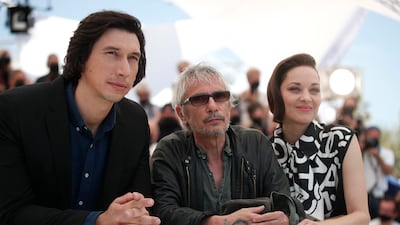Back after a year’s pandemic-induced absence, the Cannes Film Festival has opened in some style. Leos Carax’s Annette is a rock opera filled to the brim with invention and oddities. The audience in the Grand Theatre Lumiere certainly thought so, giving Carax and his team a rousing standing ovation when the film unspooled on Tuesday night.
Carax is the French enfant terrible who has made only six films in a career that stretches back almost 40 years, but then when you make idiosyncratic wonders such as Les Amants du Pont-Neuf and Holy Motors, which played in Cannes in 2012, that limited productivity is more than acceptable.
Annette, Carax’s first English-language production, is an intimate collaboration with Russell and Ron Mael. The American sibling musicians, better known as Sparks, are currently enjoying something of a renaissance what with Edgar Wright’s documentary The Sparks Brothers also due this year. They wrote all the songs in Annette, crafted in their usual whimsical Baroque style.
The opening has Carax on screen, joined by Sparks in the studio, as they sing So May We Start (with a neat pun on the French phrase "mais oui"). Marching into the streets, they’re joined by Marion Cotillard, Adam Driver and Simon Helberg, the film’s principal players, as they don their costumes in readiness for the movie's beginning. It’s an exhilarating rocket-fuelled opening, full of Carax’s overt theatricality.
Driver plays Henry McHenry, a caustic stand-up comedian crafted in the Bill Hicks/Denis Leary mould. He wears a green dressing gown throughout his act, and seems to spend most of his time abusing the audience or rolling around on the floor in mock angst. As he tells his enraptured onlookers, though, he has found love with Cotillard’s angelic opera singer Ann Desfranoux.
Helberg, who is most famous for sitcom The Big Bang Theory, here plays The Accompanist, a similar role to the one he played in Stephen Frears’ Florence Foster Jenkins. It's not the most developed character, in truth, though you sense he has a longing for Ann, whose relationship with Henry is under constant speculation. Show Bizz News, a TMZ-style celebrity gossip newsflash, frequently interrupts the narrative with updates.
While Driver’s provocative Henry thinks nothing of telling his audience that he’s killed his wife, he gradually grows sour offstage – his work no longer beloved in the way Ann’s is. Even the arrival of their baby Annette doesn’t seem to quell his moods, although he dotes on her.
One of Carax’s innovations here is to have Annette represented in doll form (brilliantly animated, it must be said), like a female Pinocchio, adding another layer of strangeness to an already strange film.
As a meditation on fame, love and celebrity, Annette has its place, although Driver’s performance frequently threatens to topple it into the abyss. It becomes increasingly hard to believe how his act – which is totally unfunny – made him famous in the first place. Compared to Driver’s early work, such as his folk singer in Inside Llewyn Davis or his tortured artist in Girls, this feels overwrought and close to parody.
Still, the film’s second half focuses on Annette, who has gifts of her own, and there’s something deeply moving about her final scene with her father, an increasingly lonely and wretched soul.
Throughout, the Sparks songs shine like stars in the sky, and if there’s any reason to engage with Annette, it’s to hear these next to Carax’s arresting visuals. The prospect of seeing the Mael brothers perform these live on stage in the future is a mouth-watering one.

